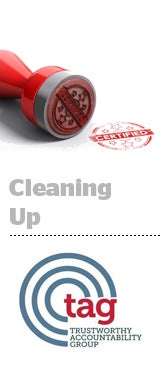 The Trustworthy Accountability Group (TAG) took the wraps off of its anti-fraud certification program on Monday, the culmination of more than a year and a half of foundation and coalition building.
The Trustworthy Accountability Group (TAG) took the wraps off of its anti-fraud certification program on Monday, the culmination of more than a year and a half of foundation and coalition building.
The program allows members of the digital supply chain – buyers, sellers and third parties – to earn a seal in exchange for proving their processes are kosher.
There are quite a few hoops to jump through, and for good reason, said Mike Zaneis, president and CEO of TAG, which was formed in 2014 as a cross-industry alliance comprised of the Interactive Advertising Bureau, the Association of National Advertisers and the American Association of Advertising Agencies.
“We need to vet everyone who participates to make sure they’re legitimate and that we’re not letting criminals in,” Zaneis said.
Different stakeholders have different requirements.
Advertisers and agencies have to go through the TAG registration process, submit to a thorough background check, appoint a dedicated compliance officer and adhere to the Media Rating Council’s guidelines on invalid traffic by agreeing to remove all nonhuman traffic from their counts.
Publishers have to do everything buyers are required to do, on top of filtering out problematic domains and data center traffic. TAG maintains lists of both, which are available to registered members. Sellers are also required to be transparent about where they source their traffic from.
As a recent report from the ANA pointed out, sourced traffic – aka traffic purchased from third parties – is a well-known breeding ground for bots and fraud.
Finally, intermediaries like ad networks, DSPs and SSPs are required to register with TAG, get a compliance officer, comply with the MRC’s guidelines on invalid traffic, filter out shady domains and data center IP traffic and obtain a payment ID to help track the money flow around ad campaigns.
Do all that, and TAG will bestow an anti-fraud seal, not unlike what the MRC confers in exchange for compliance with its protocols.
Participants thus far include four major agency holding companies – WPP, Omnicom, Publicis and IPG – and a sizable smorgasbord of digital ad players and measurement companies, including AppNexus, MediaMath, comScore, Rocket Fuel, Rubicon, TubeMogul, OpenX, SpotX, Sociomantic, Sovrn, Yahoo, Index Exchange, Horizon Media, Collective, Dstillery, Exponential, engage:BDR, Zemanta, RhythmOne, Moat, Integral Ad Science, Forensiq, DoubleVerify and White Ops.
Despite all the legwork and the TAG price tag – TAG charges a $10,000 annual fee to participate in the registry – there’s even a small independent digital ad agency based in Richmond, Va., called ndp that signed up for a seal.
“We’re looking to create a robust system where lots of companies are living up to the standard, regardless of their size,” Zaneis said. “That’s how we’ll keep putting pressure on fraudsters to make it harder and harder for them to sneak through.”
But the goal isn’t just to build higher walls, because if there’s a buck to be made, it doesn’t matter how high the walls are. The industry also needs to eliminate the profit motive for fraud, said Zaneis. It’s a matter of unsweetening the pot.
Which is where the payment ID system comes in. “If we can follow the money through the supply chain, we can halt the flow to criminals,” he said. “It’s a proactive way to kick the bad actors out of the system, and we can also start sharing the information with law enforcement.”
Of course, enforcement is a challenge, as is the case with any self-reg program.
Although TAG and its partners are more than willing to turn over information on disreputable companies to law enforcement – according to Zaneis, TAG maintains relationships with the Department of Justice, the Department of Homeland Security and the FBI – it’s hard to imagine that the feds have a robust infrastructure in place to handle digital ad fraud.
A lot of the bad actors are also located outside of the United States, which could cause logistical and jurisdictional issues.
Regardless, the program is a substantive step in the fight against ad fraud and a way for industry members from different camps to share responsibility for combating the problem, as they very well should, said Zaneis.
“We’re setting a high bar for everyone and we’re getting rid of the finger-pointing,” Zaneis said. “You worry about getting yourself over the bar and so will I. Then the dollars will flow to the trusted parties.”












